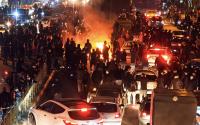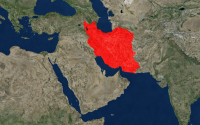12 August 2008
Not many countries name the main road from the airport in their capital city "George W Bush Boulevard", but Georgia has gone to great lengths to court the world's one remaining superpower as an insurance policy against the resurgent Russia of Vladimir Putin.
The realisation among ordinary Georgians that this has been a rather one-sided love affair has come as a profound shock. In Tbilisi, a city trying to project itself as an outpost of sophisticated western Europe, the mood is one of deep alarm interspersed with rumour about Muscovite tank columns arriving in the city.
The West, say the people here, have abandoned them to the vengeful Russians after promising support. The British Government, which only a month ago was promoting Georgia as a venue for investment and tourism, is now advising all UK citizens to leave the country.
Thea Bakarashvili, 28, said she, her family and friends were increasingly alarmed by developments. "I live in Temqa and there was an air attack there last night. We are very scared but we have nowhere to go to. I feel very sorry about the war, I cry for all the people who have been killed. But the Russians, they don't like us, I don't know when they will stop the attacks."
As well as arming the Georgian army, the US military has been training its soldiers. At the launch in 2002 of the Georgian training and equipment programme Richard Miles, the American ambassador said: "Together in the global war on terrorism we hope to promote Georgian freedom and stability and to help you to fulfil your desire to live in a... society free of threats."
In the event, the US administration began pulling out its trainers as soon as the first Russian warplane flew over Georgia. The US has evacuated more than 170 citizens and further convoys through Armenia are planned. A group of US military trainers spent their final days before evacuation at the Sheraton in Tbilisi sitting around the pool. One trainer admitted that South Ossetians were blaming the Americans for providing the Georgians with their arsenal and planning for the attack on the breakaway province. "We certainly supplied them with weapons and I wouldn't be surprised if the guys back in DC knew what was going on," he said. But shouldn't the US be helping its ally in its hour of need. "I feel a bit bad about that, but hell we are fighting in Iraq and Afghanistan we can't fight all the world's wars."
Giorgi Khulelidze, a 27-year-old accountant shook his head "So they are leaving. It was not good for our government to rely so much on another country. I cannot see how we can win this one, Russia is too powerful and we certainly cannot fight Russia by ourselves. It is very depressing but Russia will walk away from this the big winner and Georgia will maybe slip back 10 years."
At least some of the public panic is officially induced. The town of Gori, the target of Russian bombing on Saturday, emptied the following night after reports from official media outlets that the Russians were coming. At the border we had seen no such force and no such attack materialised.






